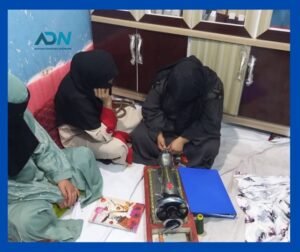Silencing Voices: The Ongoing Struggle of Afghan Right Activists Under Taliban Rule

Downtown Kabul, November 2023. Photo: @AADIL
By Ilhamuddin Afghan
The tumultuous history of Afghanistan, marked by periods of conflict and foreign interventions, has witnessed the rise and fall of governments, each leaving its unique imprint on the nation. The return of the Taliban to power in August 2021 has ushered in a new era of uncertainty and fear for Afghan civil and rights activists, whose voices once echoed calls for democracy, human rights, and social justice.
A ray of hope appeared in 2001 with the formation of an interim administration under the leadership of Hamid Karzai and backed by the international community. During this time, a new constitution was approved, designating freedom of expression and democracy as its guiding ideals. Particularly in metropolitan and peri-urban regions, the groundwork was laid for the emergence of civil society organizations and the growth of democratic institutions.
Young activists, inspired by the prospects of positive change, enthusiastically engaged in civil and social activities. Their initiatives spanned diverse fields, including good governance, anti-corruption measures, and the protection of human and women‘s rights. While these movements were not as mature as anticipated and required further nurturing, they undeniably left a significant impact on both governmental and non-governmental institutions.
However, the promising momentum was abruptly halted with the return of the Taliban. The crackdown on rights activists resulted in arrests, imprisonment, and the extraction of promises from some to abstain from further civic activities. An anonymous activist from a southern province recounted a harrowing experience of threats, inhumane treatment, and severe punishment during imprisonment by the Taliban. This activist, like many others, now lives in fear, avoiding any involvement in civic activities due to persistent Taliban threats.
“I spent several days in the Taliban prison. I was threatened, tortured, and treated very poorly by the Taliban as if I was their enemy,” he said. He stated that he had to cease all forms of activism as he is being monitored by Taliban intelligence. According to him, the Taliban have detained a significant number of rights activists since reclaiming power in August 2021. While some have been released, many remain in prisons throughout the country.
Another activist stated to the author that efforts were made by civil society representatives to engage with the Talibanupon their return to power, seeking understanding and dialogue. However, these endeavors were met with the Taliban’s unyielding attitude, characterized by arrogance and an unwillingness to listen. “Anyone not aligned with the Taliban’s ideology is viewed as their enemy,” said an anonymous activist in southern Afghanistan.
Suppressed Voices Under the Taliban Era
More than four thousand civil society entities and institutions that were once active in Afghanistan saw their activities abruptly halted with the Taliban’s return. Meetings, celebrations of national and traditional days, and other such activities are no longer allowed.
Civil society activists who once openly criticized the government during the republican era now find themselves silenced out of fear. Many have shifted focus to personal endeavors, opting for silence rather than risking accusations of being associated with the previous government.
An activist in eastern Afghanistan stated, “I’m unable to speak out due to fear. The Taliban may accuse me of being a spy for the former government. Expressing my thoughts could land me in the Taliban’s prison, where numerous activists face uncertainty and detention.”
The Taliban claim to welcome constructive criticism, but rights activists argue that there is a stark contrast between the individual assurances given and the Taliban’s radical approach in practice. Mohammad Zaryab, a social activist, stated, “We cannot criticize the Taliban’s oppression. Speaking out could lead us to end up in the Taliban’s prisons.”
Activists‘ Uphill Battle
The Taliban’s ambiguous stance on human rights, education for girls, and women’s employment, as outlined in the February 2020 peace agreement with the United States, has raised concerns among human rights organizations. The promises made in the agreement remain unfulfilled, and rights activists, especially women, face an increasingly challenging environment.
In this environment of fear and repression, the activists grapple with the dilemma of voicing their concerns and facing repercussions or maintaining a cautious silence. The struggle continues as human rights organizations shine a light on the plight of Afghan rights activists, emphasizing the need for international attention and action to protect the rights and freedoms these activists once championed.
The international community finds itself at a crossroads, torn between recognizing the Taliban as the legitimate governing authority and encouraging reconciliation or acknowledging the emerging movements as potential alternatives. The evolving landscape of opposition movements against the Taliban reflects a complex interplay of historical legacies, regional dynamics, and the consequences of international agreements.
The struggle of Afghan rights activists under Taliban rule is a poignant chapter in the country’s history. Their silenced voices echo a broader narrative of fear, repression, and the erosion of hard-fought freedoms. The international community’s role in shaping Afghanistan’s future is pivotal, with decisions made today influencing the course of the nation for years to come. The plight of rights activists calls for a collective commitment to safeguarding human rights, democracy, and the principles that lay the foundation for a just and inclusive society.
Ilhamuddin Afghan is a university professor based in Afghanistan.
Note: The contents of the article are of sole responsibility of the author. Afghan Diaspora Network will not be responsible for any inaccurate or incorrect statement in the articles.






